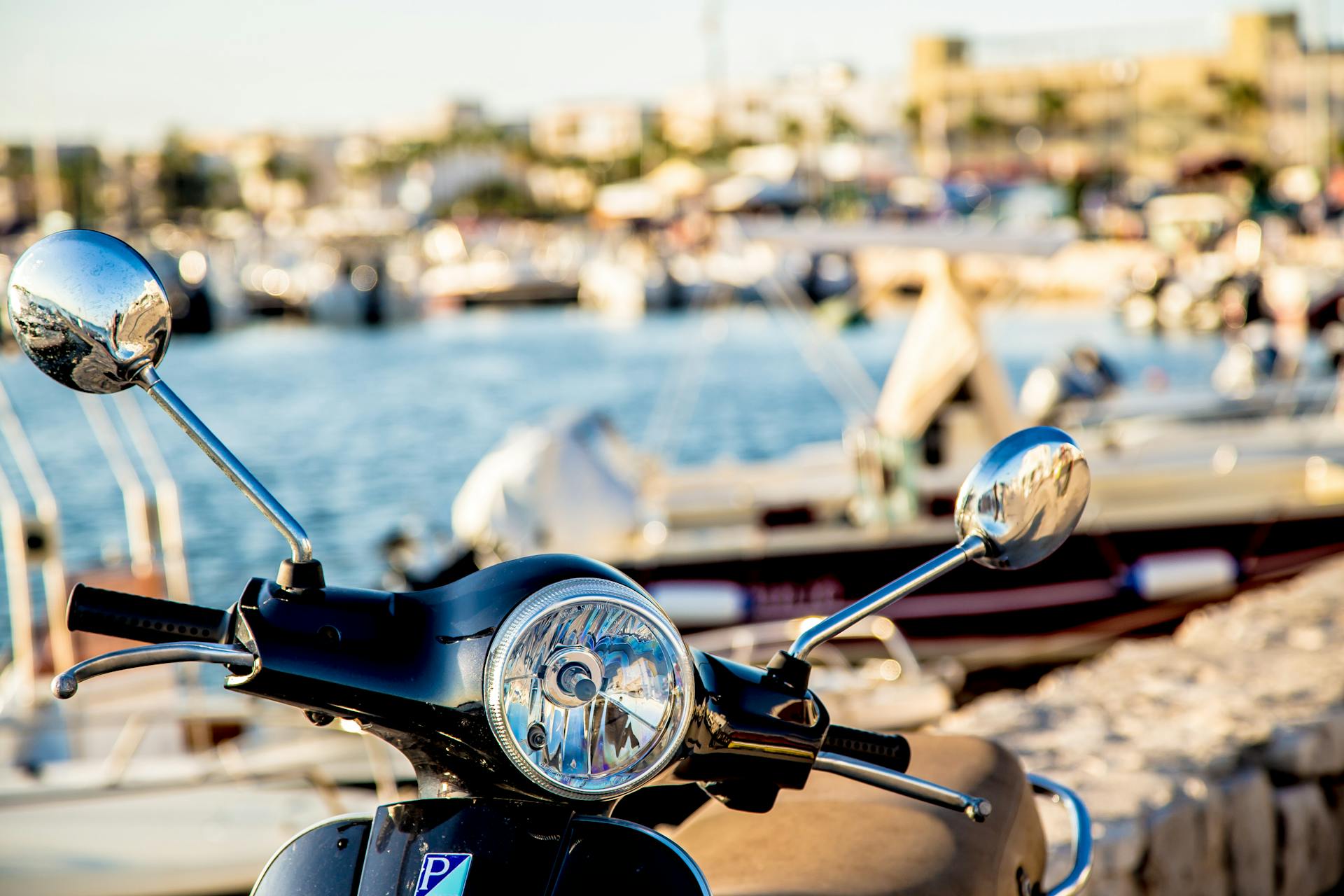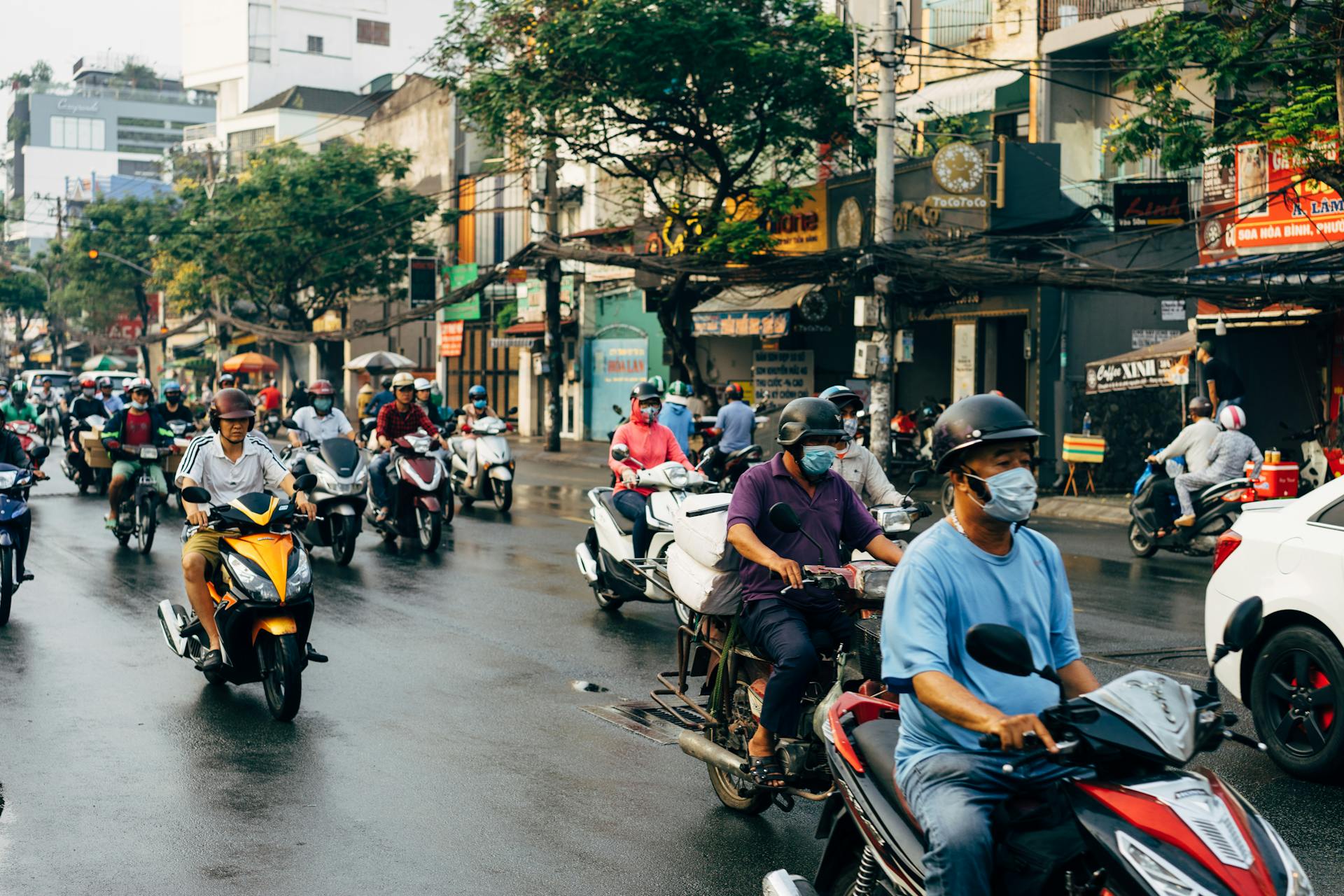
Agreed value motorcycle insurance provides a guaranteed payout in the event of a total loss, and the payout amount is predetermined when the policy is purchased.
The agreed value is based on the motorcycle's market value at the time of the policy, which is typically determined by a professional appraisal.
Having an agreed value policy can be a lifesaver if your motorcycle is totaled in an accident, as you'll receive a guaranteed payout that's not subject to depreciation.
With an agreed value policy, you can also avoid the hassle of negotiating a settlement with the insurance company, which can be a lengthy and frustrating process.
How Agreed Value Insurance Works
Agreed value insurance works by assessing the value of your motorcycle with your insurer. They may require photos or appraisals, though some insurers like Progressive collector car insurance powered by Hagerty do not require an appraisal.
Your insurer will work with you to determine the value of your motorcycle, which will be the agreed-upon value. This value will be the amount your insurer will pay out if you have a claim.

The agreed value will be the amount your insurer pays out for repairs or if your motorcycle is totaled, minus any deductible. This is in contrast to regular auto insurance, which insures vehicles for their actual cash value.
Agreed value coverage is especially important for motorcycles that may hold or increase in value over time. This means you can insure your motorcycle for its real value within the collector motorcycle market.
Some insurers may offer stated value coverage, but this is different from agreed value coverage. With stated value coverage, your insurer will pay out either the stated value or actual cash value, whichever is lower.
See what others are reading: What Does Actual Cash Value Mean on Car Insurance
Understanding Total Loss
If the insurance company declares a total loss, they'll determine the value of your motorcycle using data from sources like the National Automobile Dealers Association (NADA) or Kelley Blue Book.
The insurance adjuster will also consider the selling price of similar models in your area. Recent mods, upgrades, or improvements you've made with receipts can positively impact the actual cash value.
The estimated cost of salvage is deducted from the total value, as the insurance company typically assumes ownership of the totaled bike.
You can negotiate the total loss value if you disagree with the insurance company's valuation. Provide evidence like receipts for mods and upgrades or listings of similar models at higher prices to support your case.
Here are the key factors that determine the total loss value:
- National Automobile Dealers Association (NADA) or Kelley Blue Book data
- Selling price of similar models in your area
- Recent mods, upgrades, or improvements with receipts
- Estimated cost of salvage
Settlement and Negotiation
If you're unsure if your settlement offer is fair, compare the insurance company's valuation to your motorcycle's Fair Market Value. If similar models in your area are selling for $8,000 and your settlement offer values your bike at $6,000, you may want to negotiate.
You can negotiate your motorcycle's total loss value if you disagree with the insurance company's valuation. This means you can try to get a higher offer by providing evidence like receipts for mods and upgrades or listings of similar models at higher prices.

The insurance company determines the value of a totaled motorcycle using data from sources like the National Automobile Dealers Association (NADA) or Kelley Blue Book. They also consider the selling price of similar models in your area.
Recent mods, upgrades, or improvements can positively impact the actual cost value, so be sure to keep receipts. This could lead to a higher total loss value.
The estimated cost of salvage is deducted from the total value, as the insurance company typically assumes ownership of the totaled bike.
A unique perspective: Insurance Companies Total Motorcycles
Tax and Transfer Fee Responsibilities
When you purchase agreed value motorcycle insurance, you're essentially paying for a guaranteed payout in the event of a total loss, which is typically 90% of the agreed value.
The agreed value is usually determined by the insurance company, but you can also negotiate it with them. In some cases, the agreed value may be higher than the market value of the bike.
You're responsible for paying the transfer fee when you sell your motorcycle, which can range from $15 to $30. This fee is usually paid to the Department of Motor Vehicles (DMV) in your state.
The transfer fee is not typically covered by your insurance policy.
Check this out: Tax on Life Insurance Surrender Value
Classic Bike Insurance

Classic Bike Insurance offers agreed value options for your classic or modern classic bike, allowing you to tailor your insurance to your specific needs.
If you're reading this, you're likely already aware of the unique characteristics of classic bikes. These bikes are treated differently by their owners, who often take a high level of care to maintain their condition.
Certain things about classic motorbike insurance are quite different to standard motorbike cover, not least because the bikes themselves are different, but also because they tend to be treated quite differently by their owners.
To get a quote for your classic bike, you can fill out the online form or call 0345 872 3614. This will help you understand the costs involved.
Classic bike insurance can cover your bike for its rare and hard-to-find parts, so that replacements maintain their original integrity. It can also provide access to specialist mechanics who know exactly how to handle and restore classic models.
Curious to learn more? Check out: Does Motorcycle Insurance Cover Medical
Here are the factors that affect the cost of classic bike insurance:
- How rare your bike is: If your classic bike is a rare or limited-edition model, it could be more expensive to insure.
- Your age: Younger or less experienced riders may face higher insurance costs.
- Where you live: If your bike is kept in an area with a higher crime rate or in a less secure location, it may be more expensive to insure.
- How much you ride: If you ride your classic bike often, you might pay more for insurance than someone who rides less frequently.
- Your insurance excess: The excess is the amount you pay out of pocket before your insurance kicks in.
- Your driving record: Your insurance could be more expensive if you have a history of accidents or traffic violations.
Defining bikes as 'classic' can vary from insurer to insurer, but generally, it depends on the age of the bike, with most bikes considered classic after 20 years.
Discover more: Vintage Motorcycle Insurance
Policy and Coverage Options
Agreed value motorcycle insurance offers flexibility in determining the value of your bike. This type of coverage allows you to agree on the value of your motorcycle with your insurer, which is then used to determine the payout in case of a claim.
With agreed value coverage, you'll have peace of mind knowing your bike's value is protected, and you won't have to worry about deprecation or market fluctuations affecting its worth.
Some insurers, like Progressive, don't require an appraisal to determine the value of your collector car. However, they will review any documentation you have about the vehicle's history and current condition.
You can customize your coverage options to suit your needs, including adding extra cover options like trip interruption coverage, which pays out for lodging, transportation, and food if your bike is disabled in a collision far from home.
Broaden your view: Best Motorcycle Insurance Options for Young Riders

Here are some common coverage options for motorcycle insurance:
- Collision: Pays out for damage to your motorcycle, minus your deductible amount.
- Comprehensive: Pays out if your motorcycle is stolen or damaged by something other than a collision with another vehicle.
- Medical payments (MedPay): Pays for medical bills if you and your passenger are injured in an accident.
- Personal injury protection: Pays out for medical bills for injuries you, your passenger, or pedestrians suffer in an accident.
Coverage Options
Coverage options for motorcycle insurance are similar to those for auto insurance. Liability and uninsured/underinsured motorist coverage are standard, but you can also choose from additional options.
Collision coverage pays out for damage to your motorcycle, minus your deductible amount. A deductible is the amount you select when you buy your policy that's deducted from a claim check.
Comprehensive coverage pays out if your motorcycle is stolen or damaged by something other than a collision with another vehicle. Animal collisions are covered, and a deductible applies.
Medical payments coverage, also known as MedPay, pays for medical bills if you and your passenger are injured in an accident. This coverage is not available in all states, and it doesn't cover lost wages and other costs.
Personal injury protection (PIP) pays out for medical bills for injuries you, your passenger, or pedestrians suffer in an accident, regardless of who's at fault. However, some states may not allow insurance companies to sell this coverage to motorcyclists.
Explore further: Charlotte Motorcycle Accident Insurance Claims
Some insurance companies offer additional coverage options, such as trip interruption coverage, which pays out for lodging, transportation, and food if your bike is disabled in a collision far from home.
Here are some common additional coverage options:
- Trip interruption coverage
- Coverage for custom parts, equipment, and accessories
- Transport trailer coverage
- Roadside assistance
Some states require you to carry uninsured/underinsured motorist coverage, which pays out for injuries resulting from an accident caused by a driver who's uninsured or who doesn't have enough insurance.
Where to Buy
If you're looking to buy motorcycle insurance, you're in luck because many of the nation's biggest auto insurance sellers also carry motorcycle insurance.
You can consider purchasing motorcycle insurance from some of the top auto insurance sellers in the country, such as AAA, Allstate, American Family, and many others.
Some of these companies, like Geico and Progressive, offer motorcycle insurance as an endorsement to your auto policy if you have one.
Coverage availability and details vary by state, so be sure to check with your local insurance provider for specific information.
Here are some of the top auto insurance sellers that also sell motorcycle insurance:
Sources
- https://www.progressive.com/answers/agreed-value-insurance/
- https://www.kryderlaw.com/blog/how-to-use-a-total-loss-motorcycle-value-calculator/
- https://www.nerdwallet.com/article/insurance/motorcycle-insurance
- https://www.devittinsurance.com/motorbike-insurance/classic-bike/
- https://insurance.glatfelters.com/what-is-agreed-value
Featured Images: pexels.com


